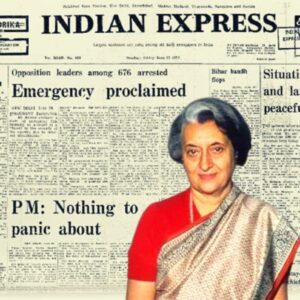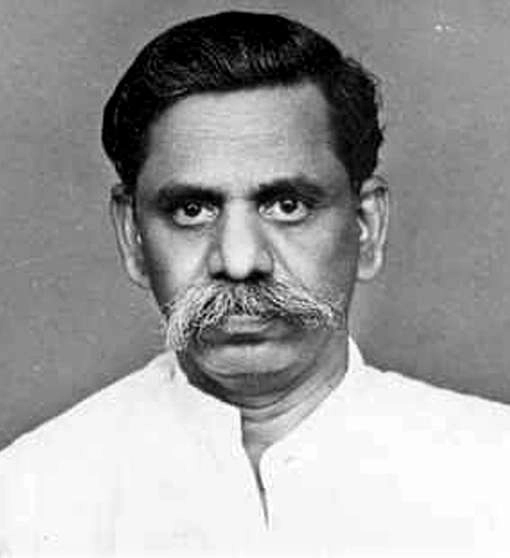M R Jambunaathan
 This Y2K generation cannot imagine that the then Attorney General, Niren De argued in the highest court of the land that ‘when emergency was proclaimed all fundamental rights under Article 19 of the constitution got suspended and hence Right to Life cannot be guaranteed’! Still more shocking was even the Supreme Court 13-member bench, tacitly concurred with that opinion. Yes, that was the situation during June 25, 1975 to Mar 21 1977.
This Y2K generation cannot imagine that the then Attorney General, Niren De argued in the highest court of the land that ‘when emergency was proclaimed all fundamental rights under Article 19 of the constitution got suspended and hence Right to Life cannot be guaranteed’! Still more shocking was even the Supreme Court 13-member bench, tacitly concurred with that opinion. Yes, that was the situation during June 25, 1975 to Mar 21 1977.
On June 25, 1975, then Prime Minister Indira Gandhi advised the under Article 352 to save the nation from the destabilising forces within and abroad. Having obtained the President’s signature, Mrs Gandhi announced over All India Radio the imposition of emergency and her oft quoted word in her short speech was ‘nothing to panic’. As if it was mere coincidence, the national capital suffered total power outrage overnight. Over the night, police acted very swiftly to arrest all the prominent leaders of opposition parties like Morarji Desai, Charan Singh, Atal Bihari Vajpayee, Lal Krishna Advani. Same was the case with the journalists like Kuldip Nayar and K R Malkani. Press was literally under ‘dark’ due to the total power shutdown.
What actually led to the imposition of emergency? After her massive victory in 1971 general elections, Indira Gandhi had clearly established her autocratic style of functioning. Prices were rising and there were protest marches across many states. Added to this was the charges of corruption on many state Chief Ministers like Bihar and Gujarat. Student leaders came to the street and conducted all forms of agitations to voice their opinion. Seeing all these, freedom fighters Jayaprakash Narain and J B Kripalani lent their support to the students. In 1974, George Fernandez organized railway strike which paralysed the railway operations for many days in many zones.
In the meanwhile, Raj Narain the runner up had challenged the election of Mrs Gandhi alleging the used bribery, government machinery and resources to gain an unfair advantage in contesting the election. He specifically charged Indira Gandhi of using government employees as election agents and of organising campaign activities in the constituency while still on the payroll of the government. On 12 June 1975, Justice Jagmohanlal Sinha found Indira Gandhi guilty of electoral malpractices. Sinha declared the election verdict in the Rae Bareilly constituency “null and void”, and barred Indira Gandhi from holding elected office for six years.
Opposition parties hiked their pitch and pace of protest. All prominent opposition leaders came together and conducted a massive meeting at Ram Lila Grounds in Delhi where in J P Narain called for a Sampoorna Kranti- Total revolution and advised Army and Police not to obey the unjust orders of the government. This was later conveniently used by Indira Gandhi for justifying the imposition of emergency.
Then followed a gloomy period of 18 months known for police excesses and brutalities unleashed against men and women of all ages who made even a feeble attempt to express their dissent. Many leading non-political organizations like Rashtriya Swayamsevak Sangh (RSS) were also banned and their leaders also were put in jail. Paramapoojaniya Bala Saheb Deoras, Sarchangachaalak, (President in common parlance) was arrested.
When these are well documented in the public domain, What is less known is the role played by RSS and how even a young Swayamsevak conducted himself with dedication and without fear in keeping the flame of freedom alive.
A book titled Poraattangal (the struggle) written by Maananeeya Raama Gopaalan, then Saha Praanta Prachaarak (Deputy State Secretary) and who later founded the Hindu Munnani speaks volume of sacrifices by the swayamsevaks. The book has used more space to recount how ordinary men and women performed extraordinary accomplishments in the service of the Motherland.
Similarly, Thuglak Editor S Gurumoorthy has also recorded his memories in Thuglak magazine over several weeks during 2021-22 about those dark days.
Many senior pracharaks like Sooryanarayana Rao (then State Genl. Secy or Praanta Prachaarak), Subba Rao ji, Shivaram ji, Padmanaban (Padduji) R Srinivasan (popularly known as 100ji), Chakravarti Gopalan and Swayamsevaks like P S Govindarajan (now Govind Srinivas), R Mukundan, Chandrasekaran coordinated in Tamilnadu amidst all odds, the second freedom movement in a silent manner by getting the messages from the senior leaders, sharing it with the persons to whom it is meant, circulating bulletins and brochures updating the general public, organizing satyagrahas, taking care of the families where their near and dear ones who were arrested, enabling the movement of key persons, contacting the leaders of political parties and opinion makers of different hues, organizing public meetings and so on so forth. The world of politics known for scheming, sweet talks and skullduggery was a stunning shocking exposure to many.
To quote a few among many anecdotes, one Swayamsevak Sri Chandrasekaran who was pursuing 1st year of graduation offered Satyagraha in front of the college, was arrested and spent months in jail because of which he was debarred from the college.
Another swayamsevak Sri Venugopal and his elder sister both of them went to jail offering satyagraha. When the police were ready to let them off, as they were young, their mother strictly told them, “Don’t apologise and come out. If you do so, don’t enter our house “. These were the words of an unlettered home maker of humble means. And she was not alone.
Another Swayamsevak Sri Jambunathan was asked, ‘what was your role’? He had an opportunity to participate only at the fag end of the movement, that too, particularly after the announcement of parliamentary elections by Feb 1977. His association with RSS was just nine months old. The real reason was revealed by area pracharak late Padmanaban ji ( fondly called Padduji) during a conversation 3 years after emergency wherein he said ‘ Jambu, I was made to believe that you were a police informer ‘.

